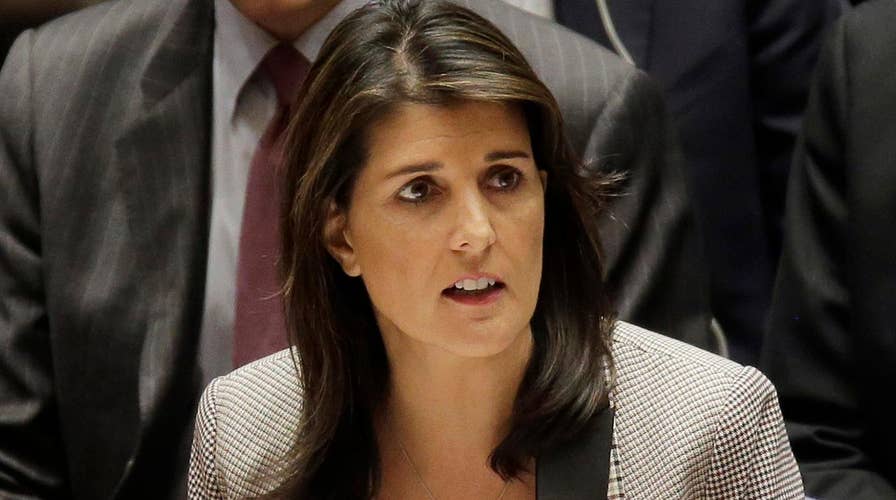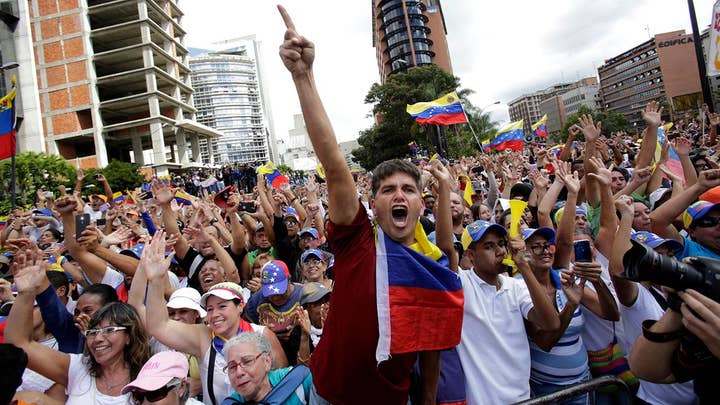The Trump administration has seen noticeable progress in calling attention to the Venezuela crisis in the United Nations and U.N. Security Council over the last couple of years -- an effort that began with former U.N. Ambassador Nikki Haley, who took up the issue when she started the job in 2017.
Haley tweeted Thursday: “3 million migrants, one million percent inflation, mass public protests – this is what Venezuelan socialism has done to its people. Free countries throughout the Western Hemisphere are standing with the Venezuelan people. Russia & China are standing with the corrupt dictator.”
Meantime, the U.S. on Thursday aimed to ramp up the pressure on Venezuela by calling for a U.N. Security Council meeting for Saturday morning to discuss the worsening crisis there, as the State Department ordered non-essential diplomats and staff at the U.S. Embassy in Venezuela to leave the country. Earlier in the day, Secretary of State Mike Pompeo called the regime of Venezuelan President Nicolas Maduro “incompetent and morally bankrupt,” while speaking at a meeting of the Organization of American States in Washington, D.C.
The U.S. and other nations on Wednesday took the highly unusual step of recognizing Juan Guaido, the opposition head of the National Assembly, as the interim president of Venezuela. Maduro, elected last year in a vote widely seen as fraudulent, still controls the military and security services and has support among at least a portion of the public. He's given no sign that he intends to step down.
In her second month as U.N. ambassador in May 2017, Haley got the Security Council to discuss the situation in Venezuela for the first time in years. While it was a closed-door meeting, she told reporters afterward that if the Venezuelan government did not listen to its citizens the council could take action.
She warned, somewhat prophetically: “We will certainly be hearing this in the Security Council because it will be a problem not just in the region but internationally.”
Haley left the post at the end of 2018. President Trump nominated Heather Nauert, a State Department spokeswoman and former Fox News host, to replace Haley, but the Senate has not cleared her nomination.
U.S. ORDERS SOME DIPLOMATS TO LEAVE VENEZUELA
“Since the crisis began we warned that it would affect other nations, which it has with millions of desperate Venezuelans fleeing to Colombia and other countries,” Jonathan Wachtel, who served as director of communications for the U.S. Mission to the United Nations under Haley, told Fox News.
He continued, “It was the right move back in early 2017 for Ambassador Haley to take the issue to the United Nations and it is even more pertinent today. Some critics accused the U.S. of imperialistic motivations in bringing the Venezuela crisis to the Security Council. That argument is ridiculous. This is about helping the Venezuelan people, who yearn for a better life and a government that cares about its own citizens.”
Later in 2017, Haley also held an informal Security Council meeting outside of the council chamber, known as an Arria Formula meeting, on human rights abuses in Venezuela. At the meeting Haley made no bones as to where she and the Trump administration stood: “Venezuela is an increasingly violent narco-state that threatens the region, the hemisphere and the world.”
Haley, in another Arria meeting last September, shined a spotlight on the corruption seen in the Maduro government.
CLICK HERE TO GET THE FOX NEWS APP
"Ambassador Nikki Haley's leadership was instrumental to spearhead the first Arria Formula on Venezuela's Humanitarian Crisis and to champion the Venezuelan cause against a Mafia Narco State on behalf of Venezuelan citizens, always keeping the interest of the American people at heart. We owe her a great deal to be where we are today," Isaias Medina, a former Venezuelan diplomat at its United Nations mission who resigned his position in protest against Maduro’s policies, told Fox News.
Meanwhile on Thursday, Russia’s United Nations Ambassador Vassily Nebenzia told reporters that Venezuela was not on the council’s agenda and said that he did not think there should be a meeting. He told reporters, “It is their internal business.”
The Associated Press contributed to this report.







